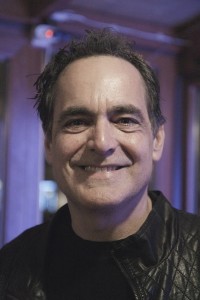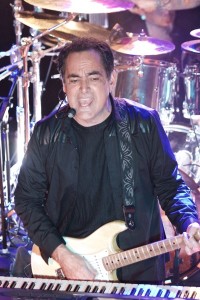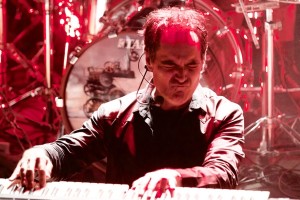Before his recent gig in Verviers, Belgium, I got the chance to chat with Neal Morse for 15 minutes. The interview was originally scheduled to be with Mike Portnoy, but due to illness he had to cancel…
Neil, you’re coming off the back of a really, really good year, what with the re-formation of Transatlantic – the new album went down a storm and it was a very successful tour…
…then you did the Prog Nation at Sea…
Yeah, where we got to perform with Jon Anderson
How was that?
It was like something from another world, you know? I mean how to describe that it’s like living in a dream. During the rehearsals Jon was having trouble remembering the words to And You And I because he hadn’t performed it in over ten years. He was looking at me because, you know, I lived on that, it’s in my bones. He would look… (sings) Sad preacher nailed upon the coloured door of time… and he was like “Would you help me?” and I was helping him, I was helping Jon (laughing)

Well at least he can hit the high notes!
(laughing) Oh he was great, he was great. And when we did the performance and rehearsed, he was so cool. He was amazing, Jon was just wonderful!
It’s such a shame that we don’t see so much of him any more.
He’s got that great project with Ponty coming up, that should be amazing.
Have to admit I wasn’t aware of that! OK, so The Grand Experiment has been getting some great reviews. It’s very much a Neal Morse album, but at the same time it’s different too. You’re normally quite a control-freak with your work, but this time you decided to come with no pre-written material.
Yeah, I guess I can be a control freak, that’s true (laughs). Well, I started learning to give up control more and more, my walk with God is something that I, and something that a lot of other people, find help give up having control. It’s one of the main things as human beings that we want to control and dominate things and have our way. But I think I started to give up so that with Transatlantic at the beginning because it was just that much more of a collaborative thing than Spock’s was, and there was nothing to do but leave the room or go through with it. And you know it wasn’t easy, it wasn’t easy sometimes, I didn’t always like the direction things were going and I just had to go on with it. In the end I learned it was better that way, and a lot of good things ended up coming of it – maybe not “better” is the right word, but it was good, it worked, and many of the things I wasn’t sure about in the beginning became things that really loved later on.
So it’s been a process with both Transatlantic and Flying Colours, letting go more. The problem is that if you bring something to the party and you really like it the way it is, and then they want to change it, that’s the hardest part. Then you’re thinking, should I just withdraw this, or is that that being selfish? It’s really hard to know sometimes… but with The Grand Experiment, what honestly made me think I should make so much room for the other guys was that’s what I felt to do in prayer. When I was praying about the session, it was like, “don’t take up too much of the space, let them paint on the canvas”. Sometimes people, especially very polite people, like Bill and Eric, they won’t force their way in, if you know what I mean. You have to make room and encourage them to come in. So I thought that this that I brought in maybe the more that they would bring and it worked.
And was the case of just turning up in the studio for a few days and jamming out some ideas?
Some of it was jamming, but the others also brought in some demos and ideas – the chorus of Waterfall with different lyrics, for instance was on one of Bill’s demos, I rewrote the lyrics. There were little bits and pieces people had and also the four of us (without Mike) got together to write about a year before that, and we had about half an hour of music I think, one of which became New Jerusalem from the bonus disc. So yeah, we had those things and then a lot of stuff we wrote in the room together, we jammed it out.
Mike was so enthusiastic and he’s quite the director of the work, he’s really good at pulling the good, the best bits out of people.
Didn’t he have a similar role when he was in Dream Theater? He used to do a lot of the direction of the band, so he’s used to playing that kind of role
Maybe. I don’t know really what he was like in Dream Theater because I wasn’t there, but he wrote a lot of music and the words too. In a lot of my projects we call him “the gleaner”. Gleaning, it’s a bit like what you do with wheat when you separate out the germ kernel from the chaff, and he’s really good at doing that. Plus he has amazing ways of figuring out how to put it all together.
The album itself sounds a little bit different from your previous work, it’s got a little more urgency – perhaps Eric’s playing is adding a metal edge?
Yeah, there’s a fine line between having your own sound and ending up repeating yourself. I think of this album like a soup, or a stew, it’s got some different ingredients in there and that make makes all the difference.
For the European touring this time you decided to bring their whole band over rather than using the European touring band, was that because the band themselves had so much inputs into the album?
Well the last time I toured with the two bands was Testimony 2, I think and it was cool, but it kinda felt funny having two different bands, two different sets of rehearsal times. I don’t know, I just felt funny about it, especially giving the people in LA a different concert from the people in London. One of the reasons I had the YouTube auditions was to be able to bring together a core group of guys who could pull all vocals off and all the the stuff, just among the five of us, so we could travel easier, rehearse easier. That’s basically how this band started and then after doing some tours together I started realise that these guys were really, really special and we should try writing together – which is how the Grand Experiment album really developed.
I’ve always been intrigued about the relationship between yourself and Mike, because from an outsider’s perspective you seem as different as chalk and cheese, the odd couple, if you like. How does it work, because you seem like such a nice guy, where as Mike, for many years came across as the bad-boy of prog…
I feel that Mike is sometimes misunderstood, but I think he’s mellowed-some since I first met him. He’s always been what I call a “stand-up guy”, somebody that you can always count on to stand with you and we’ve had that kind of relationship. Honestly, I feel like God has gotten us together for bigger purposes than just music and concerts, and we’ve become really good friends. We’ve had our skirmishes, but I really feel that the Lord helped us to always work it out in a good way. I really feel there’s a reason why we’re together and I’m looking for that. We’ve just really come to love and appreciate each other and we’re really, really good friends. We’re there for each other, which is more important than anything, really.
I’ll always remember your Testimony video where the band was in white and Mike dressed in black…
That was actually Mike’s idea to do that! Mike’s got a really, really big heart, but sometimes he is a bit of a tough guy, he’s got this East Coast thing going on – we’re all influenced from where we’re from to – so sometimes these outer things manifest a bit.
Understood. So, any plans on what you’re going to do next?
We’re looking at another Morsefest at the beginning of September, Flying Colours live album in the fall and who know what other surprises!
You never stop…
Well I’ll try to get some rest…
It has been a pleasure talking to you, Neal
It’s been my pleasure too, thanks man!


